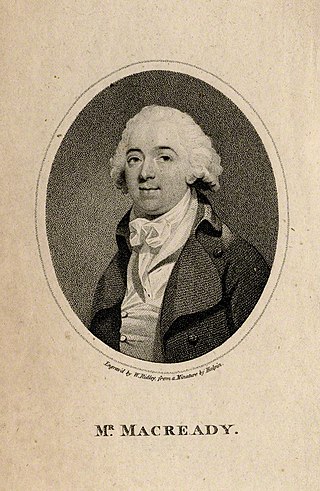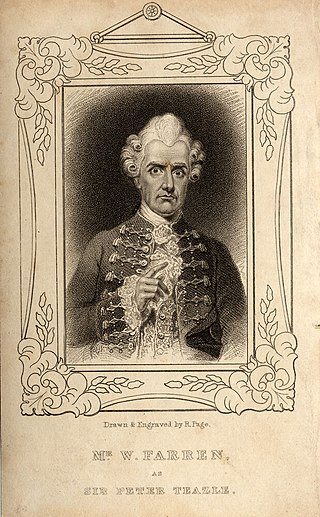Related Research Articles

Elizabeth Inchbald was an English novelist, actress, dramatist, and translator. Her two novels, A Simple Story and Nature and Art, have received particular critical attention.

John Fawcett was an English actor and playwright.
Francis Aickin, was an Irish actor, who worked at the Edinburgh Theatre in Scotland, and the between 1765 and 1792 in theatres in the West End of London.
Robert Bensley was an 18th-century English actor, of whom Charles Lamb in the Essays of Elia speaks with special praise.

Elizabeth Kemble was an English actress. From her marriage she was billed as Mrs. Kemble on playbills.
Alexander Pope was an Irish actor and painter.
John Edwin, English actor, was born in London, the son of a watchmaker. He was the long-term companion of the actress Elizabeth Walmesley who acted under the name Mrs. Edwin.
James Aickin, was an Irish stage actor who worked at the Edinburgh Theatre in Scotland and in theatres in the West End of London.

Richard Wroughton (1748–1822), was an actor, who worked mainly in Covent Garden and Drury Lane, and occasionally in the city of his birth, Bath.

Joseph George Holman (1764–1817) was an English actor, dramatist and actor-manager.

William Thomas Lewis (c.1748–1811), known as "Gentleman" Lewis, due to his refined acting style, was an English actor. Raised in Ireland, he made his name on the Dublin stage before moving to the Theatre Royal, Covent Garden in London where he spent many years. He was said to be "the most complete fop on the stage". In later life he went into theatrical management.

William Macready the Elder (1755–1829) was an Irish actor-manager.

Isabella Mattocks was a British actress and singer.

William Parsons was a British actor and painter in the mid to late eighteenth century. He appeared mostly at Drury Lane and Haymarket in minor to supporting roles, but also had prominent roles in plays like Volpone and Hamlet.
John Whitfield (1752–1814) was a British stage actor.

William Barrymore (1759–1830) was a British stage actor. Originally from Taunton he was part of a company of strolling players in the West Country, and was acting at Plymouth in 1780. He first appeared at the Theatre Royal, Drury Lane in 1782, under the management of Richard Sheridan, and became a long-standing member of the company. He is also the namesake of the famed Barrymore family.

Ralph Wewitzer (1748–1825) was an English actor. He won critical acclaim in supporting parts, but was never given leading roles. He had a 44-year acting career, and is thought to have learned over 400 speaking parts.
Elizabeth Hopkins (1731–1801) was an English stage actress of the eighteenth century. Born as Elizabeth Barton to a publican in York, she married the actor William Hopkins in 1753. and he introduced her to the stage. They acted together in the provinces and then in Edinburgh where she was original Anna in John Home's Douglas in 1756. She then went to Dublin to perform at the Smock Alley Theatre and elsewhere, although she was at one point dismissed by the company by Thomas Sheridan. When her husband was appointed as prompter at the Theatre Royal, Drury Lane in London she joined the company there, making her first appearance there in 1761. For several decades she was an integral part of the Drury Lane company, occasionally appearing elsewhere in the summer including at Richmond and the Theatre Royal, Haymarket. She transitioned in the 1780s from the younger, tragic roles she had played to older character parts such as dowagers Her final appearance was at the Haymarket in 1796. The actress Priscilla Kemble, wife of John Philip Kemble, was her daughter.

William Farren (1754–1795) was an English stage actor of the eighteenth century. He was born in London to a chandler from Clerkenwell. He made his debut at the Theatre Royal, Drury Lane in London in 1775, likely due to the influence of the actor Richard Yates and remained there until 1784 when he transferred to the rival Theatre Royal, Covent Garden. A notable early role at Drury Lane was the original Careless in Sheridan's The School for Scandal. He remained at Covent Garden until his death in 1795, making occasional summer appearances at the Haymarket. He played a mixture of supporting roles and occasional leads, and developed a reputation as a versatile actor who could appear in comedy and tragedy. He died of pneumonia and was buried at St Paul's Church in Covent Garden. His son William Farren also became an actor, and the father is sometimes known as William Farren the Elder to distinguish him.
Richard Wilson (1744–1796) was an English stage actor. He was born in Durham. After featuring in provincial theatre in Northern England and Scotland he appeared as King Lear at the Theatre Royal, Edinburgh in 1772, gaining a reputation thereafter for performing in comedies. In 1775 he joined the company of the Theatre Royal, Covent Garden in London and performed there and at the Haymarket on and off for the remainder of his career. In 1795 he was imprisoned for debt at the King's Bench Prison in Southwark and died the following year. His wife was the actress Sarah Maria Wilson.